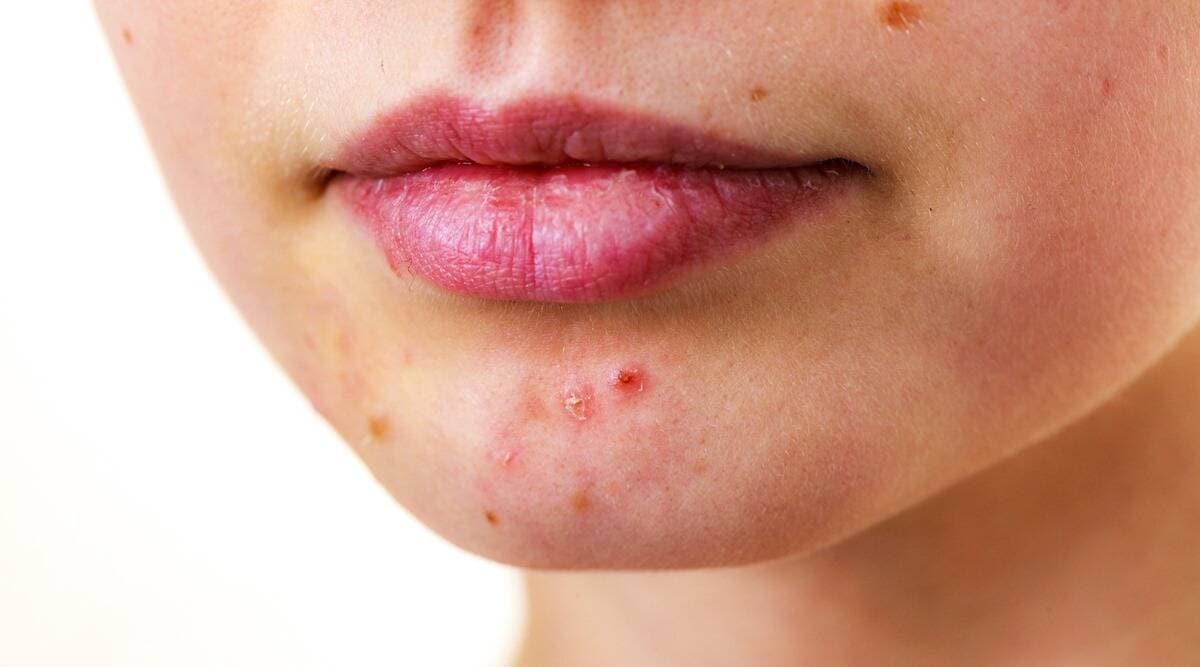The problem is not only seen in young adults but children and adults of all ages are reporting inflammatory lesions in O zone of face, some of which can also leave behind scars and dark spots on the skin

With the temperature soaring in Chandigarh and wearing of face mask being mandatory in view of Covid-19 spread, the city-based dermatologists are advising precautions to prevent breakouts on the face.
While wearing a face mask has become an important part of one’s daily routine, it seems like it will remain as a norm for the foreseeable future. However, as the summer temperature rises, along with humidity levels, skin doctors are advising precautions to prevent ‘maskne’, acne caused by wearing mask, as the issue is slowly becoming common.
Dr Vikas Sharma, MD (Dermatology) PGI, who works as the Chief Consultant Dermatologist at National Skin Hospital, Mansa Devi Complex, says that ‘maskne’ – coined after the advent of coronavirus pandemic, is a disorder of follicular occlusion and is directly related to mechanical stress (pressure, occlusion, friction) and microbiome dysbiosis (heat, pH, moisture from biofluids). Tropical climates and outdoor exposure (increased sweating) are risk factors for acne-susceptible populations (active young adults, seborrhea, genetic predisposition), he said.
Dr Sharma says special consideration for skincare should include antibacterial gentle cleansers and moisturisers formulated as prescription emollient devices, which help in maintaining a healthy skin barrier/microbiome.
“Botanical activities with anti-inflammatory, antioxidant, sebum regulation and antimicrobial properties are preferred. Hydrogel carrier formulations of combination topicals can minimise local irritation by ensuring better drug tolerance and efficacy. Allergic contact dermatitis and transcutaneous absorption of potential carcinogens can occur from textiles used for fabric face masks, which is currently unregulated,” he said.
Healthcare and other frontline workers are most at risk because their masks are tighter-fitting and they have to wear it for a longer period.
“The face masks can worsen skin issues that already exist or cause new ones, especially in the summer heat and humidity, chances for skin breakouts become manifold,” he added.
The problem is not only seen in young adults but children and adults of all ages are reporting inflammatory lesions in O zone of face, some of which can also leave behind scars and dark spots on the skin. He says that modifying the daily skin routine is the need of the hour to reduce chances of maskne.
Dr Priyansh of PGI’s Department of Dermatology says that those who wear N-95 masks for a significantly long period are prone to maskne.
“Field workers, persons who wear N-95 mask for significant duration or persons who are already having problem of acne or those with high sebaceous gland activity….measured by oiliness of skin are prone to it. I will say that for mild acne topicals are sufficient and for moderate… systemic antibiotics or retinoids are needed.”
PRECAUTIONS TO PREVENT MASKNE, TELLS DR SHARMA
Use of light moisturisers: After cleansing one’s skin, one should preferably use moisturisers that are light. Moisturisers that contain hyaluronic acid or serums are good for the skin. Serums are light and thin and they do not occlude the pores.
One should avoid using sunscreen in the areas that are covered with the mask, as it can clog the pores.
Switch to the most basic skin care routine: A gentle non-soap cleanser and a mild, fragrance-free moisturiser is recommended for sensitive skin.
“Fewer ingredients are better than more,” says the doctor, adding that besides moisturising the skin, the mild moisturisers can protect the skin from mask friction.
Break up with makeup (at least temporarily): “This is the time to really tone it down,” says Dr Sharma. The more layer of products on uses on the skin, the more opportunity there is for the bacteria to grow.
Quality of mask: There are many types of masks in the market, try and find the one with more structure to it, so it sits away from the skin, to minimise friction. Cotton masks are more breathable, which means less moisture and humidity under the mask and thus, it more gentle on the skin.
Source: Read Full Article